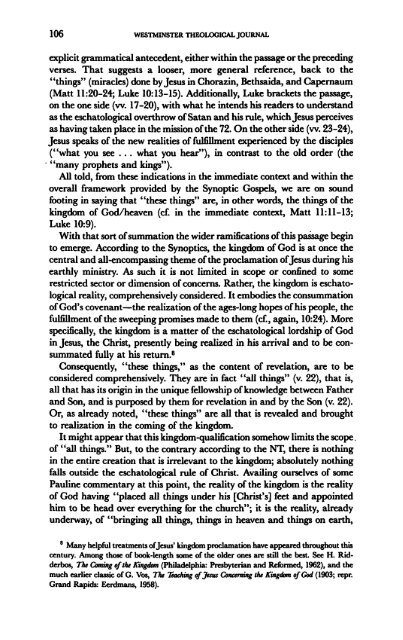NEW TESTAMENT THEOLOGY
Issues%20in%20New%20Testament%20Theology
Issues%20in%20New%20Testament%20Theology
Create successful ePaper yourself
Turn your PDF publications into a flip-book with our unique Google optimized e-Paper software.
106 WESTMINSTER THEOLOGICAL JOURNAL<br />
explicit grammatical antecedent, either within the passage or the preceding<br />
verses. That suggests a looser, more general reference, back to the<br />
"things" (miracles) done by Jesus in Chorazin, Bethsaida, and Capernaum<br />
(Matt 11:20-24; Luke 10:13-15). Additionally, Luke brackets the passage,<br />
on the one side (w. 17-20), with what he intends his readers to understand<br />
as the eschatological overthrow of Satan and his rule, which Jesus perceives<br />
as having taken place in the mission of the 72. On the other side (w. 23-24),<br />
Jesus speaks of the new realities of fulfillment experienced by the disciples<br />
("what you see . . . what you hear"), in contrast to the old order (the<br />
"many prophets and kings").<br />
All told, from these indications in the immediate context and within the<br />
overall framework provided by the Synoptic Gospels, we are on sound<br />
footing in saying that "these things" are, in other words, the things of the<br />
kingdom of God/heaven (cf. in the immediate context, Matt 11:11-13;<br />
Luke 10:9).<br />
With that sort of summation the wider ramifications of this passage begin<br />
to emerge. According to the Synoptics, the kingdom of God is at once the<br />
central and all-encompassing theme of the proclamation of Jesus during his<br />
earthly ministry. As such it is not limited in scope or confined to some<br />
restricted sector or dimension of concerns. Rather, the kingdom is eschatological<br />
reality, comprehensively considered. It embodies the consummation<br />
of God's covenant—the realization of the ages-long hopes of his people, the<br />
fulfillment of the sweeping promises made to them (cf., again, 10:24). More<br />
specifically, the kingdom is a matter of the eschatological lordship of God<br />
in Jesus, the Christ, presently being realized in his arrival and to be consummated<br />
fully at his return. 8<br />
Consequently, "these things," as the content of revelation, are to be<br />
considered comprehensively. They are in fact "all things" (v. 22), that is,<br />
all that has its origin in the unique fellowship of knowledge between Father<br />
and Son, and is purposed by them for revelation in and by the Son (v. 22).<br />
Or, as already noted, "these things" are all that is revealed and brought<br />
to realization in the coming of the kingdom.<br />
It might appear that this kingdom-qualification somehow limits the scope.<br />
of "all things." But, to the contrary according to the NT, there is nothing<br />
in the entire creation that is irrelevant to the kingdom; absolutely nothing<br />
falls outside the eschatological rule of Christ. Availing ourselves of some<br />
Pauline commentary at this point, the reality of the kingdom is the reality<br />
of God having "placed all things under his [Christ's] feet and appointed<br />
him to be head over everything for the church"; it is the reality, already<br />
underway, of "bringing all things, things in heaven and things on earth,<br />
8 Many helpful treatments of Jesus' kingdom proclamation have appeared throughout this<br />
century. Among those of book-length some of the older ones are still the best. See H. Ridderbos,<br />
The Coming of the Kingdom (Philadelphia: Presbyterian and Reformed, 1962), and the<br />
much earlier classic of G. Vos, The Teaching of Jesus Concerning the Kingdom of God (1903; repr.<br />
Grand Rapids: Eerdmans, 1958).


